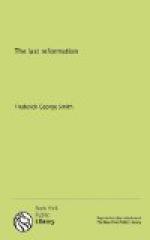With the explanation that the fourth beast signified the fourth kingdom, it is impossible to evade the conclusion that the politico-religious power symbolized by the little horn that came up among the ten horns refers directly to the papacy. There is no other object that can fulfil the prophecy. The papacy was just beginning to make itself strongly felt among the divisions of the Western Roman Empire, and it is a fact of history that three of the original ten divisions in the territory of Italy were actually plucked up successively before the rising papacy as if to give it room for development.
When the Western Empire was overthrown in A.D. 476, the kingdom of the Heruli was established in Italy. In 493 this was succeeded by the Ostrogoths, which continued for sixty years and was afterwards succeeded by the Lombards. The Lombard Kingdom was overthrown by Pepin and Charlemagne, who gave a large part of the conquered territory to the pope, thus favoring the papacy with her first temporal power. This grant completed the symbol of Daniel’s vision by constituting the papacy a temporal as well as an ecclesiastical power.
The description of the great things spoken by the mouth of the little horn and of the persecution of the true saints of God by this power corresponds so minutely with the characteristics of the first beast of Revelation 13 that no further description is here necessary. It is said that he would also “think to change times and laws.” The language is spoken as if this were a most extraordinary thing to do. Surely it is no extraordinary thing for a king to alter secular laws in his own dominion; and so far as heathen kingdoms are concerned, it would be no sacrilegious act for them to alter their religious laws and customs. But the little horn was to set himself up against the Most High and think to change His times and laws—an act of unparalleled audacity, impiety, and blasphemy. This description the papacy has consistently and constantly fulfilled. The pope has assumed the power to make time holy or unholy as he sees fit; to command men to abstain from meat and to cease work, contrary to the demands of God. He has claimed the power to dispense with God’s laws or obedience to them, “forbidding to marry,” and through his indulgences to remit the penalty due to sin.




